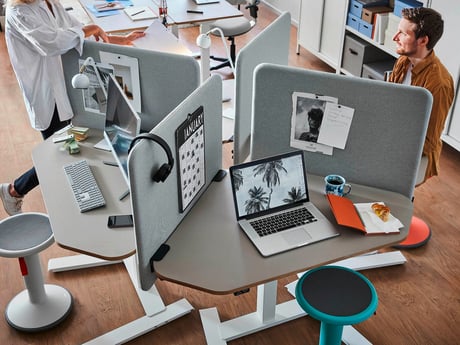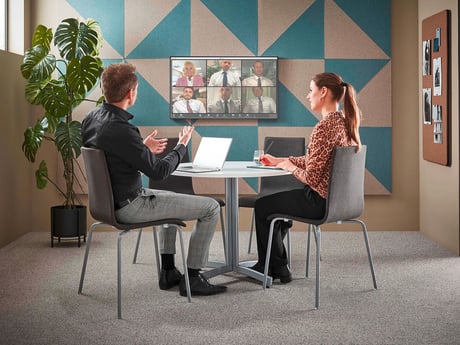- AJ Products IE
- Blog
- Tips & trends
- Tips from an HR expert: hybrid working

Tips from an HR expert: the hybrid work method
What does hybrid working mean?
Hybrid work means that you work partly from home or from a remote location elsewhere, and partly from the office. You can choose and alternate the places from where you work. The hybrid office is not a question of either but rather both. It is your needs in the moment that govern where you work. Sometimes it is best to work at home, sometimes in the office and some days maybe in a café or a co-working space. The line between physical and digital presence is blurred and the benefits range from increased freedom and less commuting to lower office rents and more satisfied employees.
What benefits and challenges have you experienced from working in a hybrid office?
Benefits
The hybrid office provides flexibility for both employees and employers. Employees get more freedom over where to live and can work from wherever they want: factors that make it easier to solve the life puzzle. Reducing the demand for premises is also positive for the company's costs.
Being able to offer some type of flexibility will be a requirement for companies that want to be an attractive and competitive employer. Being able to choose where you want to work is important for many people when looking for a new job. This means that you now can recruit coworkers from all over the country, even the whole world.
Challenges
One challenge is figuring out how to include everyone, regardless of where employees are located physically. You need to have good routines for communication and decision-making. You also need to provide reliable technology without losing important social aspects.
IT security is important. As hybrid work increases, it is important not to let go of online safety and privacy issues.
Research shows that wages and benefits risk being given to those who are in the office and therefore are more visible to both the manager and other employees. Business must take great care that employees are not treated differently.
There is also a risk to health as issues such as mental illness and addiction are more difficult to detect when the employee is not continuously at the office.
The role of the manager will change as the ways of working evolves. One must dare to let go of control and micromanagement but have a clear policy about how the work should be done.
The manager will become more of a moderator for teamworking rather than being someone who controls and governs. It is important to be extra vigilant when you don’t meet everyone on a daily basis but remember that it is individual based.
How has this approach been interpreted? (from home, wherever you want, flexibility in working hours)
Hybrid work is not something completely new or an invention of the last few years, but nowadays it is more accepted. This means that employees work from home or elsewhere for a couple of days, and from the office for a few days a week.
The same rules, routines and policies should apply regardless of where you're working. If not, an agreement should be established on a case-by-case basis.
What’s your best tip for hybrid work?
To have a well-thought-out plan!
The manager and employees must review the conditions and formulate a mutual agreement for hybrid work and what it implies. Define what a hybrid office entails: how often you have to be at the office, how to report illness, how to ensure that people don’t expect to be available at all hours, how to ensure that everyone is included, how and what to do at the office and so on.
The manager and employees have a joint responsibility to ensure that the work environment, IT security, etc. are satisfactory at the various workplaces. Don’t forget about insurance.



